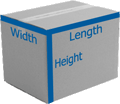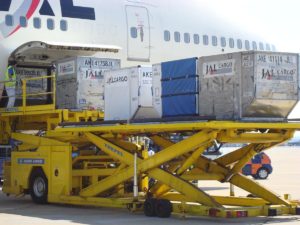How to calculate Air Freight cost?
Now that you have secured a shipment to arrange for your customer to an airport. The next question is often how do you calculate the air freight cost? You have checked for the rates for shipping this shipment to your desired airport. However the rates given are basing on kilograms (kgs) or volume weight (vw). How do you go about checking your estimated air freight cost?
What you need?
 First, you need the dimensions of the packed box or carton or crate etc. You need the length, width and height in centimeter (cm). There’s various measurement units used everywhere. Our commonly used unit is centimeter.
First, you need the dimensions of the packed box or carton or crate etc. You need the length, width and height in centimeter (cm). There’s various measurement units used everywhere. Our commonly used unit is centimeter.Using the formula, Length (in cm) X Width (in cm) X Height (in cm) divided by 6000, you will get the volume weight (vw).
Do note there are operators who use the unit of 5000 instead of 6000. This is one of the ways the freight operators use to maximize their profit. There is no right or wrong answer. So to avoid disputes, do check with your chosen operator accordingly. There are various methods every operators use to calculate the volume weight. This can make a lot of difference if your shipment is light but very bulky.
The actual weight of the finished packed box is also required. Net weight of your cargoes without the packaging would not be reflecting on the actual air freight cost. The actual air freight cost is dependent on the final weight of the accepted finished packed box.
What does the air freight cost entails?

Now armed with the above 2 information, the air freight operator will charge your shipment using the higher value. You may question why is this so?
The shipment is loaded into a shared unit load container in the airplane. This container is limited in terms of volume and weight. The bulkier your shipment is, the more space it takes up. This means that lesser cargoes can be loaded hence the charges of the larger take up space will be on your account accordingly. The heavier your shipment is, the more weight it takes up, similarly it limits the weight of the other shipments in the same container. Hence, it is relative that the charges change according to the weight taken up by your shipment as well.
If your shipment is fragile or non stackable, the space that is not used may be charged to your shipment. Any shipment that is non stackable means that lesser cargoes can be loaded in the same shared unit load container. Hence the charges of the unused space may be on your account accordingly. This also depends on the various air freight operators.
On top of this fact, most airplanes for carrying shipments are also operating as passenger planes. Of course there are also planes specially used to carry cargo shipments only. However in order to maximize profits, most airline operators make use of their passenger planes which fly daily routes to various airports to also carry shipments.
Many of the passenger flights are relatively under-utilized throughout the duration of the whole year with certain exceptions during peak travel seasons. This way they can fully utilize the empty spaces and weight on the planes to carry shipments. The airline operators are able to ferry them to the same location, saving them the additional cost to arrange another flight to the same location. With economies of scale, the airline operators are then able to offer better air freight rates.
Using this, you should be able to get the total estimated air freight cost of arranging your shipment to your customer.
Points to Note?
However do note that most air freight rate items are basing on the nearest unit. This means that if your shipment is 47.35kgs, the air freight operator charges it as 48kgs. There are also air freight operators who will use a multiplier on the volume weight or the weight (whichever is bigger) to further inflate the information. This is also one of their ways to maximize their profit.
There are also different weight breaks where air freight operators are able to give better unit rates or offers. At times, it may be more cost effective to be paying for 100kgs when your final shipment accepted weight is 95kgs.
Again, there is no right or wrong to this. When in doubt, it is always best to clarify any doubts clearly first before agreeing to any quotations and proceeding to arrange your shipments. Once any quotations are agreed and acted upon, it is very often hard to dispute as the shipments are not in your possession or ownership any more.
Feel free to contact us for any of your queries.

